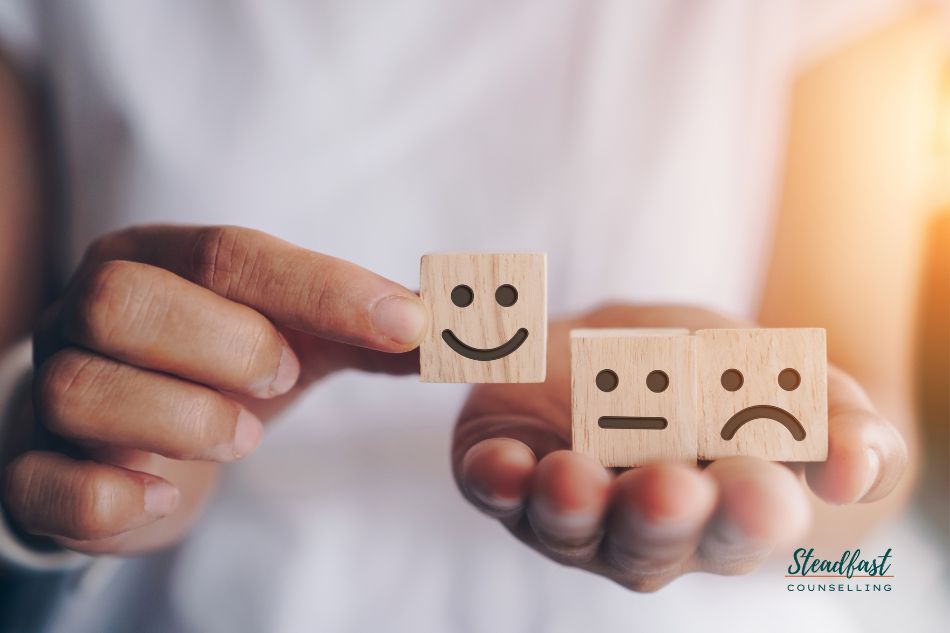If you’ve ever felt overwhelmed by your emotions or reacted in ways you later regretted, you’re not alone. Most people go through many ups and downs in their emotions every single day. Learning to manage your feelings and emotions is what we call emotional regulation. Let’s learn more!
Table of Contents
- What is Emotional Regulation?
- What Does It Mean to be Emotionally Dysregulated?
- Why Does Dysregulation Happen?
- The Benefits of Learning to Regulate Your Emotions
- 7 Ways to Emotionally Regulate Yourself
- Examples of Emotional Regulation in Everyday Life
- Tips to Help Develop Emotional Regulation Skills
- Conclusion
- Request a Consultation
What Is Emotional Regulation?
Emotional regulation is the process of managing and responding to your emotions in a healthy and balanced way. It’s about understanding your feelings, recognizing how they influence your thoughts and behaviors. Think of it as the skill that helps you keep your cool under pressure, bounce back from setbacks, and maintain a sense of well-being despite the ups and downs of life. Imagine you’re driving a car. Emotional regulation is like having good control over the steering wheel, brakes, and gas pedal. It means you can navigate through life’s ups and downs without veering off course.
When you’re good at regulating your emotions, you can recognize your feelings, understand why you’re feeling that way, and choose how to react. It doesn’t mean you won’t ever feel angry, sad, or stressed—it just means you’ll handle these emotions without letting them control you.
What Does It Mean to Be Emotionally Dysregulated?
Now, let’s talk about what happens when things go off track. Emotional dysregulation is when your emotions are all over the place. You may feel chaotic and out of control. Here are a few signs you might be experiencing emotional dysregulation:
- Frequent Mood Swings: One minute you’re happy, the next minute you’re snapping at someone.
- overwhelming emotions: You find yourself getting upset or angry over things that would not normally make you upset.
- Difficulty Calming Down: Once you’re upset, it takes a long time to calm down.
- Impulsive Behavior: You might do things on a whim when you’re emotional. For example,replying quickly to a text or email, going on shopping sprees or eating a whole tub of ice cream.
- Avoidance: You might start avoiding situations or people that could trigger your emotions.
Why Does Dysregulation Happen?
Emotional dysregulation can occur for a variety of reasons. Here are a few common ones:
- Stress: When life throws a lot at you, it can be hard to keep your emotions in check. When we face overwhelming situations, our body’s stress response system kicks in, often leading to heightened emotions. Chronic stress, whether from work, relationships, or other life pressures, can wear down our ability to regulate emotions effectively.
- Past Experiences: Traumatic experiences, especially those from childhood, can have a lasting impact on our emotional regulation abilities. Trauma can alter the way our brain processes emotions and responds to stress, making it harder to manage feelings in a balanced way. People who have experienced trauma may find themselves more easily triggered and have stronger emotional reactions.
- Mental Health Issues: Conditions such as anxiety and depression. Individuals with anxiety often experience intense worry and fear that can lead to dysregulated emotional responses. Depression can cause persistent sadness, irritability, and a reduced ability to cope with stress.
- Lack of Skills: You may not have learned how to manage your emotions in a balanced way. Without understanding our emotions and how to cope with them, we may react impulsively or inappropriately. Emotional awareness and regulation are skills that can be developed over time with practice and education.
The Benefits of Learning to Regulate Your Emotions
So, why bother learning to regulate your emotions? Here are some awesome benefits:
- Better Relationships: When you can manage your emotions, you communicate more effectively and handle conflicts better. This leads to healthier and happier relationships with friends, family, and partners.
- Improved Mental Health: Effective emotional regulation can reduce the intensity of anxiety, depression, and other mental health issues.
- Enhanced Decision-Making: When you’re not overwhelmed by your emotions, you can think more clearly and make better decisions.
- Increased Resilience: You’ll be better equipped to handle stress and bounce back from setbacks.
- Greater Happiness: Managing your emotions means you spend less time feeling bad and more time enjoying life.
- Your Emotions as an Information Source: When you are regulated you can feel and think at the same time. Your feelings matter and they can inform your decision making process.
7 Ways to Emotionally Regulate Yourself
Ready to start regulating your emotions? Here are some practical tips to get you started:
- Mindfulness and Meditation: Mindfulness is all about being present in the moment. It helps you become more aware of your emotions without getting overwhelmed by them. Try simple meditation exercises or even mindful breathing for a few minutes each day.
- Recognize Your Triggers: Pay attention to what sets off your emotions. Is it a particular person, situation, or thought? Once you know your triggers, you can start figuring out how to manage them better.
- Healthy Outlets: Find ways to express your emotions that don’t harm you or others. This could be anything from talking to a friend, journaling, painting, or hitting the gym.
- Positive Self-Talk: The way you talk to yourself matters. Instead of beating yourself up, try to be encouraging and kind. Remind yourself that it’s okay to feel how you’re feeling and that you can handle it.
- Take Care of Your Body: Physical health impacts emotional health. Make sure you’re eating well, getting enough sleep, and staying active.
- Set Boundaries: Learn to say no and set limits with others. This can prevent you from getting overwhelmed and help you manage stress.
- Seek Professional Help: If you’re struggling, there’s no shame in reaching out to a therapist or counselor. They can provide tools and strategies tailored to your needs.
Examples of Emotional Regulation in Everyday Life
Sometimes, it helps to see how these strategies work in real life. Here are a couple of examples:
- Sarah’s Story: Sarah used to get extremely anxious before work presentations. Her hands would shake, and she’d have trouble focusing. Through counseling, she learned mindfulness techniques and how to reframe her thoughts. Now, she practices deep breathing before presentations and reminds herself that she’s prepared and capable. Her anxiety has significantly decreased, and she feels more confident at work.
- John’s Story: John had a habit of snapping at his family when he was stressed. After recognizing this pattern, he started keeping a journal to identify his triggers. He realized that he often lashed out after a long day at work. Now, he takes a 10-minute walk when he gets home to clear his mind. He’s also working on positive self-talk and setting boundaries at work to reduce his stress levels.
Tips to Help Develop Emotional Regulation Skills

Tips to Help Develop Emotional Regulation Skills
Our team at Steadfast Counselling all have their own ways of practicing emotional regulation. Here are a few tips from our Counsellors:
- Going for a bike ride ~ Patrick
- Taking a walk, rain or shine ~ Jennifer
- Enjoying a short nap in the early afternoon. My brain appreciates about 20 minutes of decompression time. ~ Christa
- Listening to music or an audiobook ~ Melody
- Doing a guided meditation ~ Josh
- Taking a break and swinging in my hammock outside ~ Laura
- Taking a walk in the forest ~ Melanie
Conclusion
Emotional regulation is about understanding your feelings and learning how to handle them in a healthy way. When you regulate your emotions, you’re giving your mental health a boost and improving your life. So next time your emotions start to feel out of control, remember these tips!
Learning to live from a more regulated place is a journey. It takes time and practice, but the benefits are worth it. So, take a deep breath, be kind to yourself, and start navigating your emotions in a way that works for you.
If you are curious and want to explore your emotions and triggers, our team is here to help.






